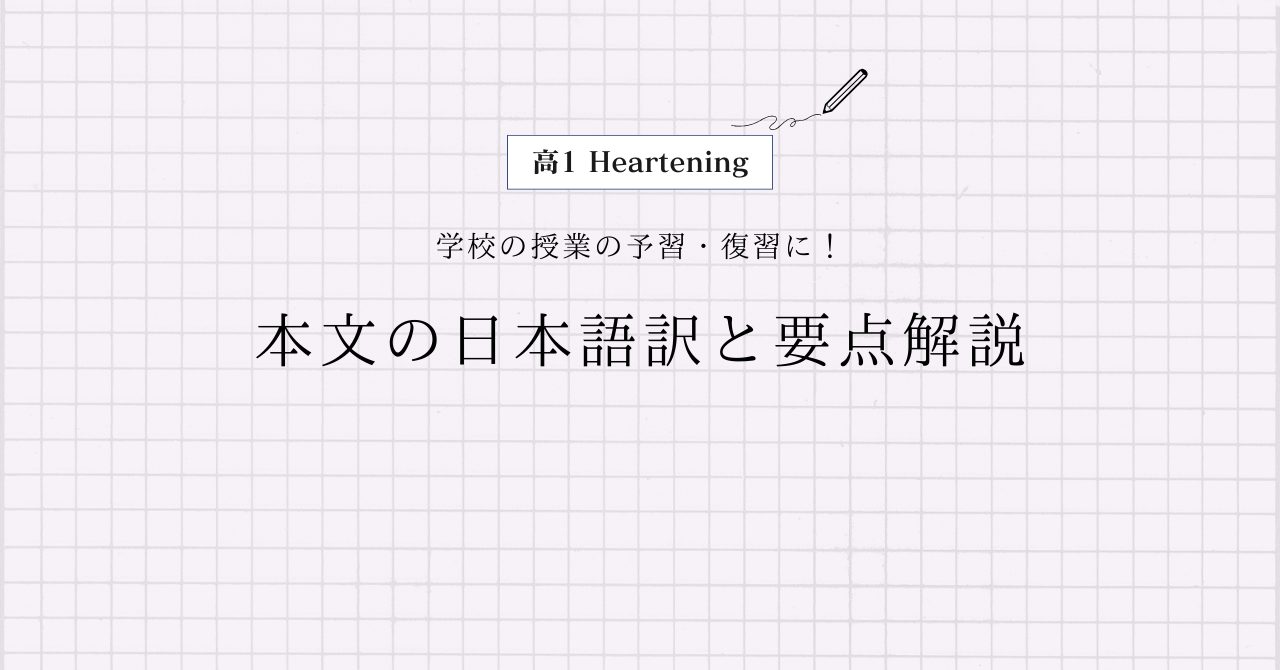桐原書店 高1Heartening Reading1 Section1の本文の日本語訳と重要箇所の解説です。
Reading1-2, 1-3, 1-4の解説はこちらからご覧ください。
>高1Heartening Reading1 Section2 本文和訳
>高1Heartening Reading1 Section3 本文和訳
>高1Heartening Reading1 Section4 本文和訳
- Heartening Reading1 Section1 本文と日本語訳
- Heartening Reading1 Section1 重要事項の解説
- The ABC’s of Courage
- It is nearing dusk.
- The man has finished his day’s labor; he is a plumber.
- Now he is sitting in the dining room of Mrs. Patricia Lord.
- Mrs. Lord and the man are bending over a list of words.
- “Can you try these now?” Mrs. Lord says.
- He looks at the top word on the list. The word is is.
- The man looks at it for a moment.
- The man hesitates.
- Seconds pass.
- He is having trouble with this one.
- Finally he says: “Play?”
- The man stares.
- He says nothing.
- Then he says, “I don’t know what it is.”
- “All right,” Mrs. Lord says softly.
- “Skip it and come back to it later.”
- Heartening Reading1 Section1 まとめ
Heartening Reading1 Section1 本文と日本語訳
The ABC’s of Courage
「勇気のABC」
It is nearing dusk.
「夕暮れが近づいてきています。」
The man has finished his day’s labor; he is a plumber.
「その男は1日の労働を終えたところです。彼は配管工です。」
Now he is sitting in the dining room of Mrs. Patricia Lord.
「今、彼はパトリシア・ロード夫人宅のダイニングルームで座っています。」
Mrs. Lord and the man are bending over a list of words.
「ロード夫人とその男は単語のリストに向かって前かがみになっています。」
“Can you try these now?” Mrs. Lord says.
「『今これに挑戦できますか?』とロード夫人は言います。」
“Yes,” the man says.
「『はい。』とその男は言います。」
He looks at the top word on the list. The word is is.
「彼はリストの一番上の単語を見ます。その単語は”is”です。」
“Is,” the man says.
「『Is』とその男は言います。」
“Yes,” Mrs. Lord says.
「『はい。』とロード夫人は言います。」
The next word on the list is brown.
「リストの次の単語は”brown”です。」
The man looks at it for a moment.
「その男はそれを少しの間見ます。」
Then he says: “Brown.”
「それから『Brown』と言います。」
“Yes,” Mrs. Lord says.
「『はい。』とロード夫人は言います。」
The next word is sleep.
「次の単語は”sleep”です。」
The man hesitates.
「男は言葉に詰まります。」
Seconds pass.
「数秒がすぎます。」
He is having trouble with this one.
「彼はこの単語に手こずっています。」
Finally he says: “Play?”
「最終的に彼は『Play?』と言います。」
“No,” Mrs. Lord says. “Look at it again.”
「『いいえ。もう一度見てください。』とロード夫人は言います。」
The man stares.
「男はじっと見ます。」
He says nothing.
「彼は何も言いません。」
Then he says, “I don’t know what it is.”
「それから彼は『何なのかわかりません。』と言います。」
“All right,” Mrs. Lord says softly.
「『わかりました。』とロード夫人は優しく言います。」
“Skip it and come back to it later.”
『それは飛ばして、後で戻ってきましょう。』

Heartening Reading1 Section1 重要事項の解説
The ABC’s of Courage
“courage”は「勇気」という名詞です。
“of”は前置詞で,”A of B”の形で「BのA」というように後ろから前に訳します。
It is nearing dusk.
天候を表現するときは、主語を“It”にします。特に訳す必要はありません。
“near”は「に近づく」という動詞で、ここでは「現在進行形」になっています。
“dusk”は「夕暮れ」という名詞ですね。
The man has finished his day’s labor; he is a plumber.
ここでは「現在完了の完了用法」が使われていますね。
“day’s”は「1日の」という意味で、“labor”は「労働」という名詞です。
「;」は「セミコロン」といって,2つの文章を繋ぐ「接続詞」のような働きをします。
“plumber”は「配管工」という名詞です。
Now he is sitting in the dining room of Mrs. Patricia Lord.
“sit”は「座る」という動詞で、ここでは「現在進行形」になっています。
“dining room”は「ダイニングルーム」という名詞、“Mrs.~”は「~夫人」という意味で、既婚の女性に対して使います。
Mrs. Lord and the man are bending over a list of words.
“bend over~”は「~に向かって前かがみになる」という意味です。ここでは「現在進行形」になっています。
“list”は「リスト」という名詞ですね。
“Can you try these now?” Mrs. Lord says.
“Can you~?”は「~してくれませんか」という依頼する重要表現ですね。“Can”の代わりに“Will”を使ってもOKです。
また,“Could”か“Would”を使うこともできて,その場合は「~していただけませんか」とより丁寧な表現になります。
“try”は「を挑戦する、やってみる」という動詞ですね。
“these”は“this”の複数形で,「これらは(の)」といった意味になります。
He looks at the top word on the list. The word is is.
“top”は「1番上の」という形容詞で、“list”は「リスト」という名詞ですね。
The man looks at it for a moment.
“it”は“brown“を指していますね。
“for a moment”は「少しの間、一瞬」といった表現になります。
The man hesitates.
“hesitate”は「ためらう、言葉に詰まる」という動詞です。
Seconds pass.
“second”は「秒」という名詞で、“pass”は「過ぎる、経つ」という動詞になります。
He is having trouble with this one.
“have trouble with~”は「~に手こずる、~に問題がある」という重要表現です。ここでは「現在進行形」になっていますね。
“this one”は“sleep”を指しています。
Finally he says: “Play?”
“finally“は「最後に」という副詞です。
「:」は「コロン」と言い,簡単に言うと「つまり」という具合に直前の文章を補足します。コロンを使うときは,コロンの前は必ず文にしないといけない点に注意してください。
The man stares.
“stare”は「じっと見る」という動詞です。
He says nothing.
“nothing”は「何も~ない」という代名詞です。
Then he says, “I don’t know what it is.”
“then”は「それから、その後、そのとき」といった副詞ですね。
“what it is”は「間接疑問文」になっていて、“it”は“sleep”を指しています。
“All right,” Mrs. Lord says softly.
“all right”は「大丈夫だ、わかった」といった会話表現です。
“softly”は「優しく、穏やかに」という副詞ですね。
“Skip it and come back to it later.”
この文は「命令文」になっていますね。
“skip”は「を飛ばす」といった動詞で、“come back to~”は「~に戻る」という表現です。
“later”は「後に、その後」といった副詞になります。
Heartening Reading1 Section1 まとめ
以上がHeartening Reading1 Section1の日本語訳となります。
>高1Heartening Reading1 Section2 本文和訳
>高1Heartening Reading1 Section3 本文和訳
>高1Heartening Reading1 Section4 本文和訳
何か分からない点や他に解説してほしい点があれば,お気軽にコメントしてください!


コメント